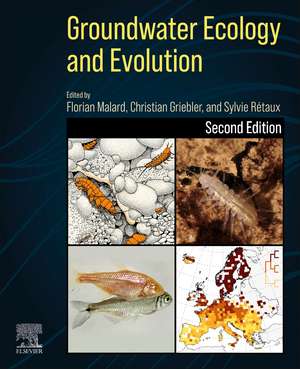Groundwater Ecology and Evolution
Editat de Florian Malard, Christian Griebler, Sylvie Retauxen Limba Engleză Paperback – 13 mar 2023
- Provides a modern synthesis of research dedicated to the study of groundwater biodiversity and ecosystems
- Bridges the gap between community ecology, evolution, and functional ecology, three research fields that have long been presented isolated from each other
- Explains how this trans-disciplinary integration of research contributes to understanding and managing of groundwater ecosystem functions
- Reveals the contribution of groundwater ecology and evolution in solving scientific questions well beyond the frontiers of groundwater systems
Preț: 550.38 lei
Preț vechi: 711.30 lei
-23% Nou
Puncte Express: 826
Preț estimativ în valută:
105.32€ • 112.62$ • 87.81£
105.32€ • 112.62$ • 87.81£
Carte tipărită la comandă
Livrare economică 11-25 aprilie
Livrare express 13-19 martie pentru 86.22 lei
Preluare comenzi: 021 569.72.76
Specificații
ISBN-13: 9780128191194
ISBN-10: 0128191198
Pagini: 640
Dimensiuni: 191 x 235 x 36 mm
Greutate: 1.08 kg
Ediția:2
Editura: ELSEVIER SCIENCE
ISBN-10: 0128191198
Pagini: 640
Dimensiuni: 191 x 235 x 36 mm
Greutate: 1.08 kg
Ediția:2
Editura: ELSEVIER SCIENCE
Cuprins
Introduction
Section 1: Setting the scene: groundwater as ecosystems
1. Hydrodynamics and geomorphology of groundwater environments
2. Classifying groundwater ecosystems
3. Physical and biogeochemical processes of hyporheic exchange in alluvial rivers
4. Ecological and evolutionary jargon in subterranean biology
Section 2: Drivers and patterns of groundwater biodiversity
5. Groundwater biodiversity and constraints to biological distribution
6. Patterns and determinants of richness and composition of the groundwater fauna
7. Phylogenies reveal speciation dynamics: case studies from groundwater
8. Dispersal and geographic range size in groundwater
Section 3: Roles of organisms in groundwater
9. Microbial diversity and processes in groundwater
10. Groundwater food webs
11. Role of invertebrates in ecosystem processes and services
Section 4: Principles of evolution in groundwater
12. Voices from the underground: animal models for the study of trait evolution during groundwater colonization and adaptation
13. Ecological and evolutionary perspectives on groundwater colonization by the amphibian Proteus anguinus
14. The Asellus aquaticus species complex: an invertebrate model in subterranean evolution
15. Developmental and genetic basis of troglomorphic traits in the teleost fish Astyanax mexicanus
16. Ecological and evolutionary perspectives on groundwater colonization by the amphipod crustacean Gammarus minus
17. Evolutionary genomics and transcriptomics in groundwater animals
Section 5: Biological traits in groundwater
18. Dissolving morphological and behavioral traits of groundwater animals into a functional phenotype
19. Life histories in groundwater organisms
20. Physiological tolerance and ecotoxicological constrains of groundwater fauna
Section 6: Section 6: Biodiversity and ecosystem management in groundwater
21. Global groundwater in the Anthropocene
22. Assessing groundwater ecosystem health, status and services
23. Recent concepts and approaches for conserving groundwater biodiversity
24. Existing framework for the conservation of groundwater biodiversity and ecosystem services
Section 1: Setting the scene: groundwater as ecosystems
1. Hydrodynamics and geomorphology of groundwater environments
2. Classifying groundwater ecosystems
3. Physical and biogeochemical processes of hyporheic exchange in alluvial rivers
4. Ecological and evolutionary jargon in subterranean biology
Section 2: Drivers and patterns of groundwater biodiversity
5. Groundwater biodiversity and constraints to biological distribution
6. Patterns and determinants of richness and composition of the groundwater fauna
7. Phylogenies reveal speciation dynamics: case studies from groundwater
8. Dispersal and geographic range size in groundwater
Section 3: Roles of organisms in groundwater
9. Microbial diversity and processes in groundwater
10. Groundwater food webs
11. Role of invertebrates in ecosystem processes and services
Section 4: Principles of evolution in groundwater
12. Voices from the underground: animal models for the study of trait evolution during groundwater colonization and adaptation
13. Ecological and evolutionary perspectives on groundwater colonization by the amphibian Proteus anguinus
14. The Asellus aquaticus species complex: an invertebrate model in subterranean evolution
15. Developmental and genetic basis of troglomorphic traits in the teleost fish Astyanax mexicanus
16. Ecological and evolutionary perspectives on groundwater colonization by the amphipod crustacean Gammarus minus
17. Evolutionary genomics and transcriptomics in groundwater animals
Section 5: Biological traits in groundwater
18. Dissolving morphological and behavioral traits of groundwater animals into a functional phenotype
19. Life histories in groundwater organisms
20. Physiological tolerance and ecotoxicological constrains of groundwater fauna
Section 6: Section 6: Biodiversity and ecosystem management in groundwater
21. Global groundwater in the Anthropocene
22. Assessing groundwater ecosystem health, status and services
23. Recent concepts and approaches for conserving groundwater biodiversity
24. Existing framework for the conservation of groundwater biodiversity and ecosystem services
